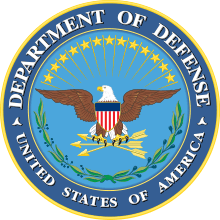United States Secretary of the Air Force
| Secretary of the Air Force | |
|---|---|
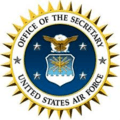 Seal of the Secretary of the Air Force | |
 Flag of the Secretary of the Air Force | |
| Department of the Air Force | |
| Style |
Madam Secretary The Honorable (formal address in writing) |
| Reports to |
Secretary of Defense Deputy Secretary of Defense |
| Appointer |
The President with the advice and consent of the Senate |
| Term length | No fixed term |
| Precursor | Secretary of War |
| Inaugural holder | Stuart Symington |
| Formation | 18 September 1947 |
| Succession | 4th in SecDef succession |
| Deputy |
The Under Secretary (principal civilian deputy) The Chief of Staff (military advisor and deputy) |
| Salary | Executive Schedule, Level II |
| Website | Office of the Secretary |
The Secretary of the Air Force (SecAF, or SAF/OS) is the head of the Department of the Air Force, a component organization within the United States Department of Defense. The Secretary of the Air Force is appointed from civilian life by the President, by and with the advice and consent of the Senate.[1] The Secretary reports to the Secretary of Defense and/or the Deputy Secretary of Defense, and is by statute responsible for and has the authority to conduct all the affairs of the Department of the Air Force.[2]
The Secretary works closely with his or her civilian deputy, the Under Secretary of the Air Force; and his or her military deputy, the Chief of Staff of the Air Force, who is the senior-most uniformed officer in the United States Air Force.
The first Secretary of the Air Force, Stuart Symington, was sworn in on 18 September 1947 upon the re-organization of the Army Air Forces into a military department and a military service of its own, independent of the War Department/Army, with the enactment of the National Security Act.
On 16 May 2017, Heather Wilson was sworn in as the next Secretary of the Air Force. Wilson was nominated by President Donald Trump on 23 January 2017, and confirmed by the US Senate on 8 May 2017.
Responsibilities
The Secretary is the head of the Department of the Air Force, analogous to that of a chief executive officer of a corporation. The Department of the Air Force is defined as a Military Department.[3] It is not limited to the Washington headquarter staffs, rather it is an entity which includes all the components of the United States Air Force and the Air National Guard:
The term 'department', when used with respect to a military department, means the executive part of the department and all field headquarters, forces, reserve components, installations, activities, and functions under the control or supervision of the Secretary of the department.[4]
The exclusive responsibilities of the Secretary of the Air Force are enumerated in Title 10 Section 8013 (b) of the United States Code. They include, but are not limited to:
(1) Recruiting.
(2) Organizing.
(3) Supplying.
(4) Equipping (including research and development).
(5) Training.
(6) Servicing.
(7) Mobilizing.
(8) Demobilizing.
(9) Administering (including the morale and welfare of personnel).
(10) Maintaining.
(11) The construction, outfitting, and repair of military equipment.
(12) The construction, maintenance, and repair of buildings, structures, and utilities and the acquisition of real property and interests in real property necessary to carry out the responsibilities specified in this section.[5]
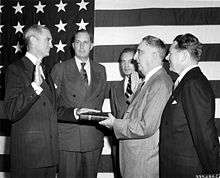
By direction of the Secretary of Defense, the Secretary of the Air Force assigns military units of the Department of the Air Force, other than those who carry out the functions listed in 10 USC 8013 (b), to the Unified and Specified Combatant Commands to perform missions assigned to those commands. Air Force units while assigned to Combatant Commands may only be reassigned by authority of the Secretary of Defense.[6]
However, the chain of command for Air Force units for other purposes than the operational direction goes from the President to the Secretary of Defense to the Secretary of the Air Force to the Commanders of Air Force Commands.[7] Air Force Officers have to report on any matter to the Secretary, or the Secretary's designate, when requested. The Secretary has the authority to detail, prescribe the duties, and to assign air force service members and civilian employees, and may also change the title of any activity not statutorily designated.[8] The Secretary has several responsibilities under the Uniform Code of Military Justice (UCMJ) with respect to Air Force service members, including to authority to convene General Courts Martial and to commute sentences.
The Secretary of the Air Force may also be assigned additional responsibilities by the President or the Secretary of Defense,[9] e.g. the Secretary is designated as the "DoD Executive Agent for Space", and as such:
...shall develop, coordinate, and integrate plans and programs for space systems and the acquisition of DoD Space Major Defense Acquisition Programs to provide operational space force capabilities to ensure the United States has the space power to achieve its national security objectives.[10][11]
Office of the Secretary of the Air Force
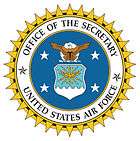 | |
| Agency overview | |
|---|---|
| Formed | 1947 |
| Headquarters | Pentagon |
| Parent agency | Department of the Air Force |
The Secretary of the Air Force's principal staff element, the Office of the Secretary of the Air Force, has responsibility for acquisition and auditing, comptroller issues (including financial management), inspector general matters, legislative affairs, and public affairs within the Department of the Air Force. The Office of the Secretary of the Air Force is one of the Department of the Air Force's two headquarter staffs at the seat of government, the other one is the Air Staff.
Composition
The Office of the Secretary of the Air Force is composed of:
- Under Secretary of the Air Force
- The Deputy Under Secretary of the Air Force for International Affairs
- The Deputy Under Secretary of the Air Force for Space Programs
- Assistant Secretary of the Air Force for Acquisition
- Assistant Secretary of the Air Force for Financial Management and Comptroller
- Assistant Secretary of the Air Force for Installations, Environment and Logistics
- Assistant Secretary of the Air Force for Manpower and Reserve Affairs
- General Counsel of the Department of the Air Force
- Inspector General of the Air Force
- Chief of Legislative Liaison
- Administrative Assistant to the Secretary of the Air Force
- Auditor General of the Department of the Air Force
- Air Reserve Forces Policy Committee
Chronological list of Secretaries of the Air Force
| No. | Image | Name | Term of office | Secretary of Defense | Appointed by President | ||
|---|---|---|---|---|---|---|---|
| Began | Ended | Days of Service | |||||
| 1 | 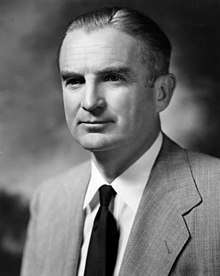 |
W. Stuart Symington | 18 September 1947 | 24 April 1950 | 949 | James Forrestal Louis Johnson |
Harry S. Truman |
| 2 |  |
Thomas K. Finletter | 24 April 1950 | 20 January 1953 | 1002 | Louis Johnson George Marshall Robert Lovett | |
| 3 | 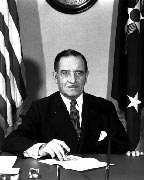 |
Harold E. Talbott | 4 February 1953 | 13 August 1955 | 920 | Charles Wilson | Dwight D. Eisenhower |
| 4 | 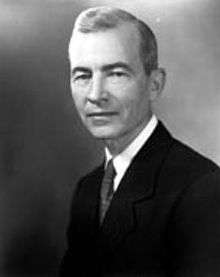 |
Donald A. Quarles | 15 August 1955 | 30 April 1957 | 624 | ||
| 5 | 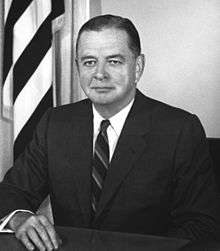 |
James H. Douglas, Jr. | 1 May 1957 | 10 December 1959 | 953 | Charles Wilson Neil McElroy Thomas Gates | |
| 6 | _Page_022-1.jpg) |
Dudley C. Sharp | 11 December 1959 | 20 January 1961 | 406 | Thomas Gates | |
| 7 |  |
Eugene M. Zuckert | 24 January 1961 | 30 September 1965 | 1710 | Robert McNamara | John F. Kennedy |
| 8 | 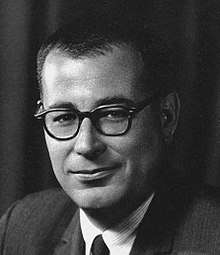 |
Harold Brown | 1 October 1965 | 15 February 1969 | 1233 | Robert McNamara Clark Clifford Mel Laird |
Lyndon B. Johnson |
| 9 | 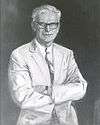 |
Robert C. Seamans, Jr. | 15 February 1969 | 15 May 1973 | 1550 | Mel Laird Elliot Richardson |
Richard M. Nixon |
| Acting |  |
John L. McLucas | 15 May 1973 | 18 July 1973 | 64 | Elliot Richardson James Schlesinger | |
| 10 | 18 July 1973 | 23 November 1975 | 858 | James Schlesinger Donald Rumsfeld | |||
| Acting |  |
James W. Plummer | 24 November 1975 | 1 January 1976 | 38 | Donald Rumsfeld | Gerald Ford |
| 11 | 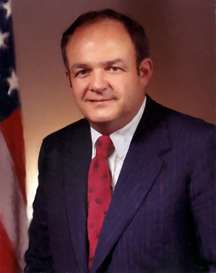 |
Thomas C. Reed | 2 January 1976 | 6 April 1977 | 460 | Donald Rumsfeld Harold Brown | |
| 12 | John C. Stetson | 6 April 1977 | 18 May 1979 | 772 | Harold Brown | Jimmy Carter | |
| Acting | 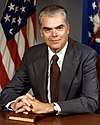 |
Hans Mark | 18 May 1979 | 26 July 1979 | 69 | ||
| 13 | 26 July 1979 | 9 February 1981 | 564 | Harold Brown Caspar Weinberger | |||
| 14 | Verne Orr | 9 February 1981 | 30 November 1985 | 1755 | Caspar Weinberger | Ronald Reagan | |
| 15 |  |
Russell A. Rourke | 9 December 1985 | 6 April 1986 | 118 | ||
| Acting | 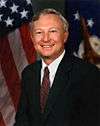 |
Edward C. Aldridge Jr. | 6 April 1986 | 8 June 1986 | 63 | ||
| 16 | 9 June 1986 | 16 December 1988 | 921 | Caspar Weinberger Frank Carlucci | |||
| Acting | James F. McGovern | 16 December 1988 | 29 April 1989 | 134 | Frank Carlucci Dick Cheney | ||
| Acting | John J. Welch, Jr. | 29 April 1989 | 21 May 1989 | 22 | Dick Cheney | George H. W. Bush | |
| 17 | Donald B. Rice | 1 May 1989 | 20 January 1993 | 1360 | |||
| Acting | 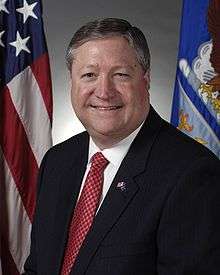 |
Michael B. Donley | 20 January 1993 | 13 July 1993 | 174 | Les Aspin | Bill Clinton |
| Acting | Merrill A. McPeak | 14 July 1993 | 5 August 1993 | 22 | |||
| 18 | 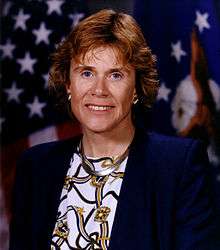 |
Sheila E. Widnall | 6 August 1993 | 31 October 1997 | 1547 | Les Aspin William Perry William Cohen | |
| Acting | 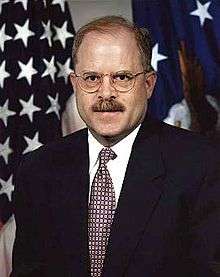 |
F. Whitten Peters | 1 November 1997 | 30 July 1999 | 636 | William Cohen | |
| 19 | 30 July 1999 | 20 January 2001 | 540 | ||||
| Acting | 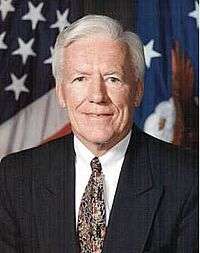 |
Lawrence J. Delaney | 21 January 2001 | 31 May 2001 | 130 | Donald Rumsfeld | George W. Bush |
| 20 |  |
James G. Roche | 1 June 2001 | 20 January 2005 | 1329 | ||
| Acting | 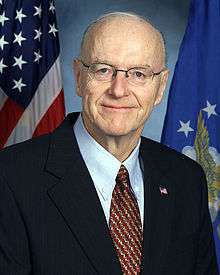 |
Peter B. Teets | 20 January 2005 | 25 March 2005 | 64 | ||
| Acting |  |
Michael Montelongo | 25 March 2005 | 28 March 2005 | 3 | ||
| Acting | 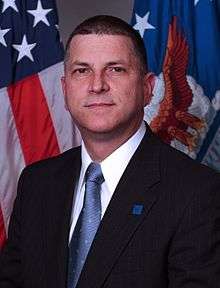 |
Michael L. Dominguez | 28 March 2005 | 29 July 2005 | 123 | ||
| Acting |  |
Pete Geren [12] | 29 July 2005 | 4 November 2005 | 98 | ||
| 21 | 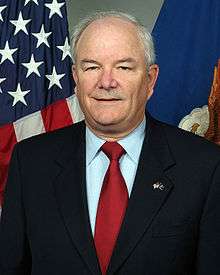 |
Michael Wynne | 4 November 2005 | 20 June 2008[13] | 959 | Donald Rumsfeld Robert Gates | |
| Acting |  |
Michael B. Donley | 21 June 2008[13] | 2 October 2008 | 103 | Robert Gates Leon Panetta Chuck Hagel |
Barack Obama |
| 22 | 2 October 2008 | 21 June 2013 | 1723 | ||||
| Acting |  |
Eric Fanning | 21 June 2013 | 20 December 2013 | 182 | Chuck Hagel Ash Carter | |
| 23 | Deborah Lee James | 20 December 2013 | 20 January 2017 | 1127 | |||
| Acting | Lisa Disbrow | 20 January 2017 | 16 May 2017 | 116 | Jim Mattis | Donald Trump | |
| 24 | _(cropped).jpg) |
Heather Wilson | 16 May 2017 | Incumbent | 526 | ||
See also
References
- Title 10 United States Code
- Subtitle A – General Military Law
- CHAPTER 1 – DEFINITIONS
- § 101. Definitions
- CHAPTER 1 – DEFINITIONS
- Subtitle D – Air Force
- CHAPTER 6 – COMBATANT COMMANDERS
- § 162. Combatant command: assigned forces; chain of command
- CHAPTER 803 – DEPARTMENT OF THE AIR FORCE
- § 8011. Organization.
- § 8013. Secretary of the Air Force.
- § 8014. Office of the Secretary of the Air Force.
- § 8015. Under Secretary of the Air Force.
- CHAPTER 805 – THE AIR STAFF
- § 8032. The Air Staff: general duties
- § 8033. Chief of Staff
- CHAPTER 6 – COMBATANT COMMANDERS
- Subtitle A – General Military Law
- Executive Order 12909, Order of Succession of Officers To Act as Secretary of the Air Force
- Department of Defense Directive (DODD) 5100.1, Functions of the Department of Defense and Its Major Components, August 1 2002.
- Department of Defense Directive (DODD) 5101.2, DoD Executive Agent for Space, June 3 2003.
Notes
- ↑ 10 USC 8013 (a)
- ↑ 10 USC 8013 (a)-(b)
- ↑ 10 USC 101 (a)(8)
- ↑ 10 USC 101 (a)(6)
- ↑ 10 USC 8013 (b)
- ↑ 10 USC 162 (a)
- ↑ DODD 5100.1, 6.1.
- ↑ 10 USC 8013 (f-g)
- ↑ 10 USC 8013 (d)
- ↑ DODD 5101.2, 3. MISSION
- ↑ http://dod-executiveagent.osd.mil/agentListView.aspx?ID=55
- ↑ DefenseLink News Article: Army Secretary Resigns in Wake of Walter Reed Outpatient-Care Shortfalls
- 1 2 Air Force Almanac 2011, Accessed on 12 September 2011
External links
- Leaders Through the Years, 2012 USAF Almanac
- US Air Force Senior Leadership at Archive.is (archived 12 December 2012)
.jpg)

